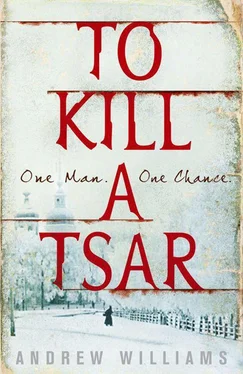‘Students, some respectably dressed young women, a young man in tweed with an exotic blue tie, but of more importance, these two.’ Dobrshinsky took two small photographs from the file and slid them across the desk to Barclay.
‘The one on the right is Mikhailov — rather an old photograph, and on the left, the Jew, Goldenberg. The dvornik had no difficulty in identifying him. Mikhailov arrived and left with a young woman, petite, dark.’ Dobrshinsky paused, lifting his elbows to the desk, hands together as if in prayer, intense concentration written on his face. ‘Her description seems to match one we have of a woman seen leaving the square after the attempt on His Majesty’s life.’
‘Do you want me to arrest Madame Volkonsky?’ Barclay asked.
‘Leave her — for now. Keep the house under surveillance. Have her followed. I don’t expect Mikhailov tells her anything, but he may risk using Number 86 for another gathering. She’s probably giving him money. I think it’s fair to assume Mikhailov and Goldenberg are still in the city. And now, if you please…’ Dobrshinsky nodded to the young agent perched anxiously at the edge of his chair.
‘Yes, Your Honour.’ Kletochnikov looked unsure quite what was expected of him.
‘Tell Major Barclay what the city police have told you.’
‘It’s Popov, Your Honour, the student revolutionary implicated in the death of the informer — Bronstein. He’s been seen among the men at the Baird Works.’
One of the foundry hands had tipped off the local police, Kletochnikov explained. Popov and the Muscovite labourers with whom he shared the room at the Neva were organising political meetings in the homes of sympathisers, distributing propaganda, agitating for a secret trade union, and the socialist gospel they preached was attracting new recruits, although the city police could not be sure how many.
‘So, as you see, another opportunity,’ said Dobrshinsky, impatiently pushing back his chair and rising to his feet. ‘Which is well and good because General Drenteln and the Justice Ministry are impatient for results. Soloviev was a nobody. It’s the men who gave him his gun and sent him out that we want.’
He turned to gaze out of the window on to the Fontanka, and for a moment the silence in the room was broken only by the noise of a carriage clattering along the embankment below and the heavy tick of the French clock on the mantelpiece.
‘Popov may be close to Mikhailov — Bronstein saw them together,’ Dobrshinsky said, turning to face them again. ‘Let’s find out where he lives then pick him up. He’s a nobody but he may take us one step closer to the six on the hotel list. ’
With a nod and casual wave of the hand, the collegiate councillor drew the meeting to a close. He slipped back behind his desk and was pulling a file across it when, almost as an afterthought and without lifting his head he said, ‘Oh, Vladimir Alexandrovich?’
‘Your Honour?’ Barclay was halfway to the door.
‘Would you like my clock?’
‘I don’t understand, Your Honour?’
‘What don’t you understand? Would you like my clock?’ he asked again with an enigmatic smile. ‘It is an excellent clock. It never seems to wind down or stop.’
‘Thank you, Your Honour, I have one of my own.’
It was with more than a little trepidation that Frederick Hadfield stepped from the droshky on to the pavement at the foot of St Boris and St Gleb. Pressing five kopeks into the cabby’s hand, he plucked his father’s battered medical bag from the seat and turned towards the shell of the new church rising from a forest of scaffolding on the bank of the Neva before him. Three towers in the Byzantine style were almost complete, but construction of the central dome had barely begun. The low wharf buildings and the school adjoining the site were painted in pink dust and probably had been for every one of the ten years since the foundation stone was cemented into place. The city’s wealthier inhabitants were not inclined to reach very deeply into their pockets to pay for a church they would never visit. The Peski district had an unsavoury reputation for crime and drunkenness, and gangs of youths roamed its badly lit, rubbish-strewn streets at night, unchecked by the police. Behind the peeling facades of its old rooming houses, the poor lived from hand to mouth in cramped and unsanitary conditions. A warren of dark corridors and flats, with many families forced to share a single noisy insalubrious room, privacy a thickness of tattered curtain. The district was home to a class of society the city government tried to pretend it owed no obligation to — shop assistants, factory workers and their families, apprentices, students, the jobless and destitute. The poorest of all lived in ramshackle wooden buildings — some no more than huts but others of two or three storeys — thrown up on unclaimed ground between the mansion blocks. Hadfield had never needed to visit Peski although the Nikolaevsky Hospital was at the edge of the district and some of his patients were drawn from its streets. But a foolishly sentimental thought and an ambush at the opera placed him under an obligation to spend the day of rest in this most unappealing part of the city. The Times ’s man, George Dobson, had inquired as to his mental health then accused him of being a dangerous radical.
‘How on earth did you get roped into it? When I write your obituary,’ he joked over lunch, ‘I will be sure to inform our readers that choosing to venture into Peski on a Sunday was not the selfless act they might think but a disgracefully vain one.’
They had dined well together and for too long at one of the city’s best restaurants and Hadfield was an hour later than promised at the church. He was to wait in front of the dusty scaffolding at the west end where he would be met and taken to the clinic. Swinging his medical bag a little to draw attention to his profession, he wandered to and fro in its shadow, scrutinising the faces of passers-by for a flicker of recognition. He was on the point of giving up when a boy of about ten, in a traditional belted shirt and with a shock of unkempt red hair, ran out of an alley at full pelt and across the square towards him.
‘Doctor?’ he asked breathlessly, his head bobbing in an awkward show of deference. ‘This way, please.’
‘You’ve been sent by Miss Kovalenko?’
‘To take you to the clinic,’ he said, wiping his nose with a dirty hand. ‘You’re late.’
It was all Hadfield could do to keep pace as the boy set off at a trot across the square. On into the dingy alley he had burst from with its galleried timber houses and shop fronts clinging to the mansion blocks like growths, damp and rutted underfoot, the air thick with the stench of rotting vegetable matter and effluent. On past a tavern, a drunk lying face down on the cobbles, the beery carousing of many rising from the cellar below. Right then left then right again, twisting and turning, laundry dripping from the balconies above, an old man in rags hobbling along with his stick, street urchins with bare feet playing with a simple wooden top in the filth, and a young woman with greasy hair, her face empty of expression. After fifteen minutes’ hard walking the boy stopped at the door of a long two-storey building rather older in style than the rest of the street and, judging from what was left of the plaster, once a blue-grey colour. Chunks of render had fallen from the wall, exposing the naked pink brick behind, and there were rusty bars before the windows, opaque with grime and bird shit. The boy’s fist was raised to the door but it opened before he could knock to reveal a babushka with three small children. Beyond them, a gloomy hall with at least twenty people standing against the walls or sitting on low benches, their faces turned towards Hadfield and the light.
Читать дальше












